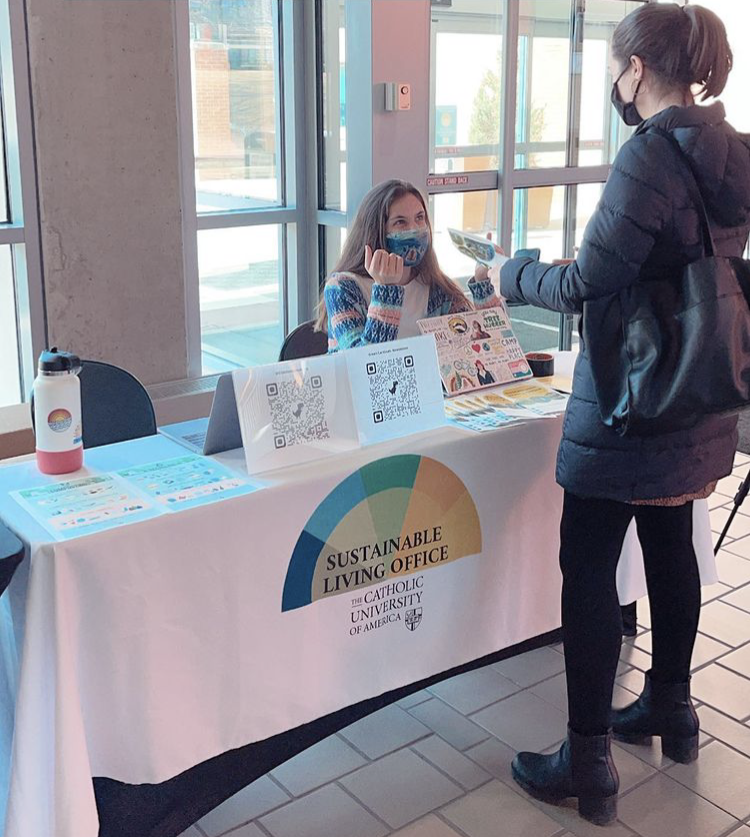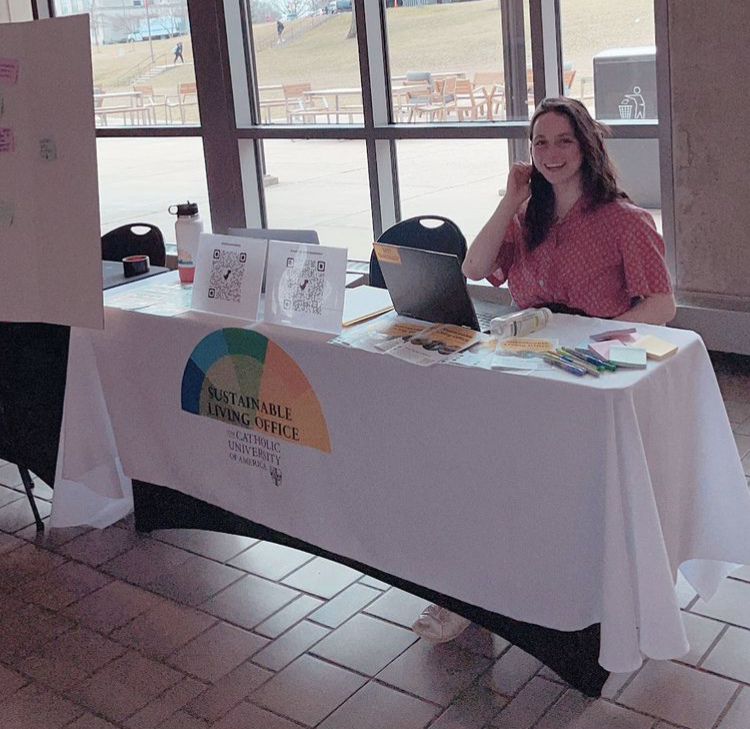The Sustainable Living Independent Study provides students with the opportunity to earn course credit for working on sustainability initiatives on campus. The independent study serves as a bridge between the Office of Campus Sustainability, other sustainability and environmental organizations on campus, and the student body, faculty, and staff. The goal is to embrace student ideas, energy, and initiative and turn it into tangible actions and programs that will leave a lasting impact on campus. Check out some project highlights below!
Interested in joining the independent study? Sign up for ARPL 494/594 or reach out to sustainability@cua.edu with any questions!
-
Cardinal Closet
In Spring 2022, one of the students in the Sustainable Living Independent Study designed a project focused on fast fashion. Her goal was to create a thrift store on campus, so during the spring semester she collaborated with the Facilities team on campus to locate a suitable space, researched and visited other university thrift stores to understand their best practices, and hosted an initial clothing donation drive. Cardinal Closet, as the thrift store was named, opened to the community in Fall 2022. Throughout the 2022-2023 academic year, Cardinal Closet facilitated over 1,200 clothing swaps, ran two clothing drives in partnership with the Busch School of Business and the Guadeloupe Project, and hosted nearly a dozen pop-ups in the Pryz. -
Food Recoveries
In Spring 2022, one of the students in the Sustainable Living Independent Study decided to focus on identifying opportunities to reduce food waste on campus. She worked with Dining Services to identify streams of food waste on campus and with Campus Ministry to find opportunities to recover and donate food to local organizations. As a result of her and subsequent students' efforts during Fall 2022 and Spring 2023, throughout the 2022-2023 academic year, over 750 meals were donated to House of Ruth and Food Rescue US - DC.
-
Sustainability in the Classroom
In Fall 2022, two students decided to focus their project on integrating conversations on sustainability into more of the University curriculum. They spoke with five professors in the School of Theology and Religious Studies to gain their insight and buy-in, as well as with the Center for Teaching Excellence to develop a resource guide, discussion questions, and a workshop for faculty members. These resources are designed provide faculty with a range of ideas and strategies for integrating sustainability into their courses. In addition, in Spring 2022, one student decided to focus her project on offering sustainability tours to classes in the School of Engineering. She coordinated directly with professors to design tours that would use the campus as a living laboratory for their students. The tours have continued into Fall 2022 and will be offered to more classes every semester. As of Spring 2023, over 60 students have benefited from these tours.
-
Community Garden
In Fall 2022, the Sustainable Living Independent Study was offered to students studying at the University’s Rome Campus. Six students enrolled and decided to use their project to build a community garden on campus. They collaborated with the management and groundskeeping teams on the campus, sourced funding and supplies, and built a garden that will provide fresh produce and herbs to future semesters of students studying in Rome. Additionally, students in Fall 2022 and Spring 2023 contributed to the community garden on the DC campus through working to maintain the garden and plan for the 2023 planting season.
-
Composting
In Fall 2022 & Spring 2023, students decided to tackle compost contamination in the Pryzbyla Center. They conducted multiple waste audits to understand how many non-compostable items are discarded in the compost bins and the most common contaminants. Using this data, they designed potential interventions including lids for the compost bins that create a barrier to people accidentally throwing trash in the compost and provide information on what is compostable. The lids were installed during Spring 2023 and shown to significantly reduce the compost contamination rate.
-
Recycled Materials Closet
In Spring 2023, one student decided to tackle the issue of resource waste in the School of Architecture and Planning. She conducted research with current and former students to understand how students handle excess materials at the end of each semester, and learned that most students trash items that could instead be donated and reused. She opened the Recycled Materials Closet to collect excess materials and supplies throughout the Spring 2023 semester, and all of donations will be available for free to students starting in Fall 2023. The Recycled Materials Closet will be an ongoing initiative in the Crough building to foster a zero waste mindset amongst the students. -
Green Move-Out
In Fall 2022, two students decided to focus on designing a Green Move Out program for the University for Spring 2023. The students conducted extensive research and interviews with other universities that have well-established Green Move Out programs; collaborated with offices on campus that would need to be involved to obtain their buy-in, including Housing, Residence Life, and Facilities; identified organizations interested in taking donations; identified the necessary supplies and developed a budget; and began creating marketing materials and volunteer resources. As a result of their efforts, the University successfully hosted a Green Move Out program in Spring 2023 for the first time in years.
-
Environmental Networking Fair
In Spring 2022, one of the students focused her efforts during the semester on encouraging students to consider career paths in sustainability. She coordinated a networking fair held during the Climate Change and the Future of Work Conference on April 22nd. The fair provided students with an opportunity to speak directly with organizations working in a variety of fields to grow their networks and learn how the organizations are adapting to the realities of climate change.


